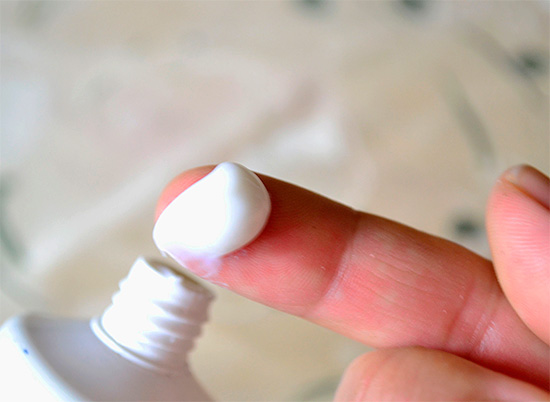
Next you will learn:
- Does toothpaste help with acne and how to effectively apply it for this purpose;
- What is the mechanism of action of the paste on the inflamed area of the skin;
- What components should be present in the composition of the toothpaste so that it helps to fight acne, and which ingredients should beware;
- Safety rules during the procedure;
As well as other interesting and important practical nuances.
In general, we can say that acne toothpaste is a remedy of about the same efficiency category as the use of vasoconstrictor drops for the treatment of the common cold (there is some effect, but there is no treatment as such). In other words: no dermatologist or endocrinologist will ever advise you to use this tool, but at the same time, supporters of traditional medicine use it very actively and not always to no avail.
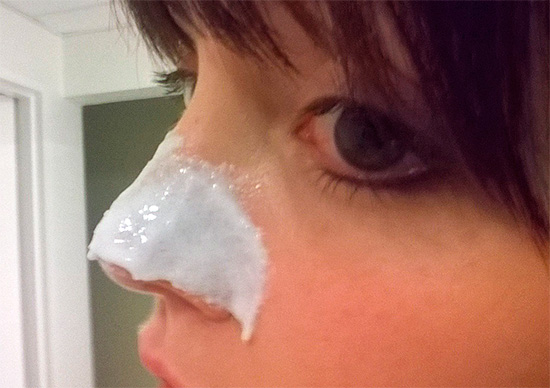
Accordingly, there are no serious studies that would prove that acne toothpaste really helps - all the popularity of the method is based only on the feedback of ordinary people who, so to speak, conducted experiments on themselves and evaluated the results. Examples of such reviews, as well as interesting theoretical and practical aspects of the use of toothpastes for getting rid of acne, we will consider in more detail below.
On a note
Today on sale there is a very wide range of various toothpastes, the composition of which can radically vary. For example, there are special whitening toothpastes, with fluoride and without fluoride, to combat inflammation and bleeding of the gums, with special enzymes that facilitate the removal of plaque, with and without powerful antiseptics, highly abrasive and low abrasion, with herbal extracts, with strontium compounds, zinc and potassium - for sensitive teeth ... etc.
Thus, it is obvious that not every toothpaste is suitable against acne on the face. Keep in mind that the use of some of them for this purpose can be simply dangerous for the skin - we will also touch on this issue a little lower.
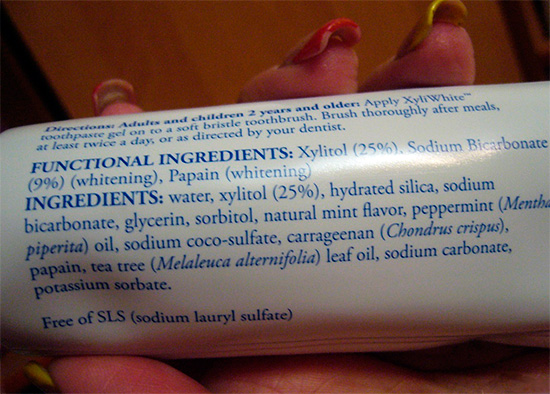
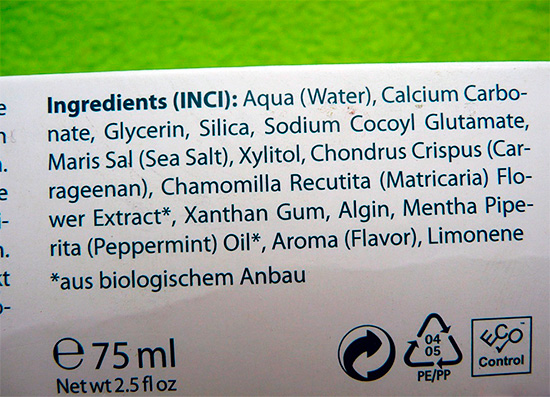
With that said, talking about whether toothpaste helps with acne or not can only be applied to a specific paste. Otherwise, it will be the same as saying: they say, tablets help relieve heat. Yes, they help, but only certain drugs.
Similarly with pastes - when two different people try to use two different toothpastes to remove acne on their faces, then their results can be completely opposite.
Feedback
“I heard at university that toothpaste helps with acne. A friend said that she just spreads every pimple and then they quickly pass. I also tried, but somehow I did not feel a special effect. The paste dries the skin very much, and if the pimple has already appeared, then it does not matter to him. Once the whole night she kept it anointed, all to no purpose ... "
Alena, Volgodonsk
We remove pink glasses: how can paste really help with acne?
The ability of toothpaste to help with acne is rationally explained by the anti-inflammatory properties of the drug - while they, these properties, must be determined by the appropriate component composition. Toothpaste and acne no longer have any “intersection points."
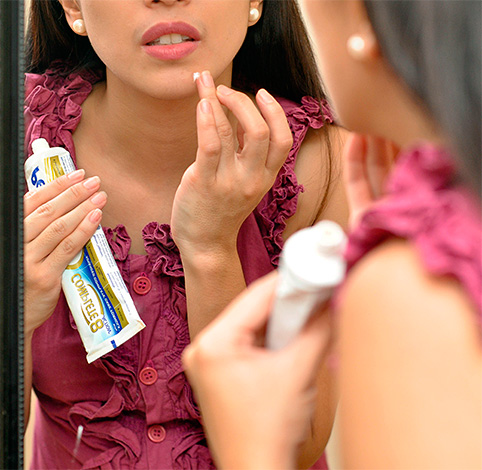
Remember what acne (acne) is? Almost always, it is inflammation of the sebaceous gland or hair follicle: the secreted sebum can be an excellent food for bacteria that live on the surface of the skin, which ultimately causes a local inflammatory process.
Normally, the greasy secretion contains a sufficient number of bactericidal components that do not allow bacteria to multiply too much.But sometimes this balance is broken. There may be several reasons for this:
- Decrease in the number of bactericidal components in secret due to hormonal surges and changes in endocrine regulation (often happens in adolescents);
- Too much fat (so-called "oily skin");
- Creating a kind of greenhouse conditions for bacteria: for example, the skin does not wash for a long time, sweat and particles of the dying epidermis accumulate on it (a normal situation for hiking). A person constantly sweats, the skin does not breathe. Bacteria multiply and cause inflammation of the sebaceous glands, since bactericidal components can no longer cope with their function.
As soon as the bacteria “colonize” the hair follicle or the sebaceous pore, the products of their vital activity and the remains of the dead microbes themselves begin to accumulate in the zone of active reproduction of microorganisms. In response to this, the protective mechanism of the immune system is launched here and local inflammation develops, accompanied by reddening of the tissues and an even more intensified influx of cells of the immune system. These cells, together with the remnants of the bacteria themselves, form pus.
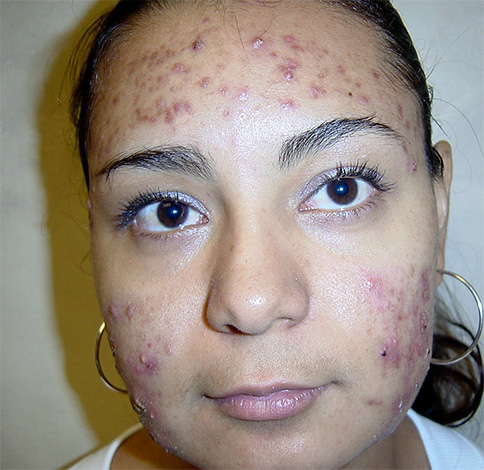
So what can an ordinary “average” toothpaste do in this situation? The fact of the matter is that not very much.
Toothpaste cannot affect the work of the human endocrine system. Reduce fat production - also can not. The only way to influence is to suppress the vital activity of bacteria due to antiseptic and anti-inflammatory components.
On a note
From the above theoretical calculations, a simple practical conclusion follows: even if you try to regularly smear acne with toothpaste, this will not help get rid of their reappearance. In other words, if there are appropriate prerequisites, then acne will appear in any case.
So, we came to an important idea: you can try to spread a pimple with a toothpaste containing powerful antibacterial components (sometimes they are not quite correctly called anti-inflammatory) - and this will help stop the process of further bacterial reproduction, which means that it will not allow the pimple to grow in size and even stronger fester.
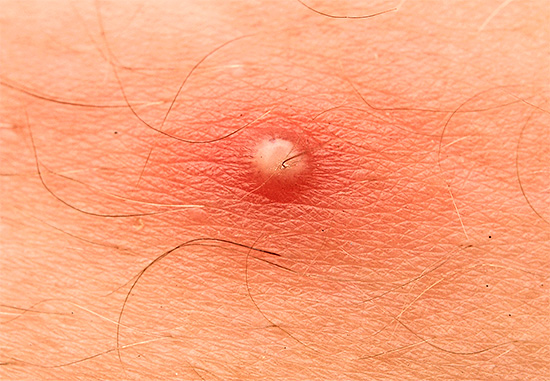
It is important to understand that even when using toothpaste with effective antiseptics, the existing inflammation and pus will not immediately resolve in a magical way. The body will still need some time to go through the natural processes of resorption of pus and inflammation. That is, it makes no sense to hope that on the site of a juicy acne the next morning, healthy-pink skin will show off a pale pink color.
Feedback
“Toothpaste does not help get rid of acne on the face, that's for sure, I checked it on myself. And more than once, but already checked four times, it was constantly conducted for the approval of relatives, acquaintances, all kinds of aunts from the forums. The first time I don’t remember what I tried, about 20 years old, after the first birth - no result. Acne still appears. The second time I treated with Blendamed, I specially took a paste for the treatment of gums. Disappointed. Last year, after the second birth, my friend told me so convincingly about the Amway paste that she could almost clean her shoes. I tried it twice. I thought maybe before the pastes I chose the wrong ones. And also zero. The only effect is that if you spread the whole area on the cheek where there are a lot of small pimples, then the next day the whole area in such small scabs. It seems that each pimple is crusted from above and it dries. But acne itself does not disappear. ”
Olesya, Moscow
If the toothpaste is selected correctly, contains antiseptic and anti-inflammatory components, then there are certain prerequisites for the fact that it will help to quickly remove inflammation in the place where the pimple was originally. And, perhaps, this is the only positive action that you can count on.
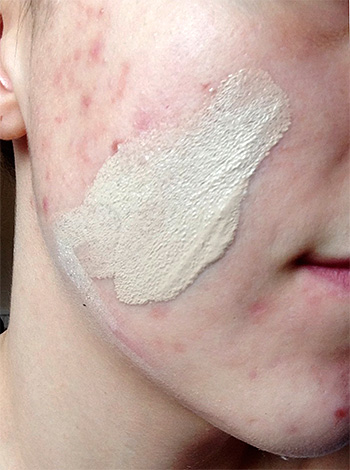
But there are many "pitfalls" and dangerous moments that are useful to know in advance. Here are just a few of them:
- Some whitening pastes contain carbamide peroxide (sometimes they simply indicate hydrogen peroxide) - a powerful oxidizing agent that, in case of prolonged contact with the skin, could theoretically cause a chemical burn (but in practice, due to the low concentration of the substance, in most cases it will cost only reddening of the skin after prolonged contact);

- The composition of some "advanced" toothpastes includes various enzymes, for example, bromelain (Bromelain, obtained from pineapple pulp), which can break down the protein matrix of plaque. However, with the same success, this enzyme will show its aggressive effect in relation to the delicate skin of the face, so do not try to make a face mask from this paste for the night!

- Certain plant extracts and essential oils can cause severe allergies. As a result, instead of a small pimple, you can earn a big red spot or even raw material on the entire cheek or forehead (for example, there are cases of severe allergy to oak bark, which is often used in toothpastes designed to combat gum diseases).

Judging by the reviews on the Internet, many people believe that if you completely cover your skin with toothpaste from time to time and leave such a mask for a while (for example, at night), then you can destroy all bacteria and, thus, prevent acne . But this is an erroneous opinion: firstly, most toothpastes dry the skin very much and will lead to peeling, irritation and even the appearance of microcracks and sores.
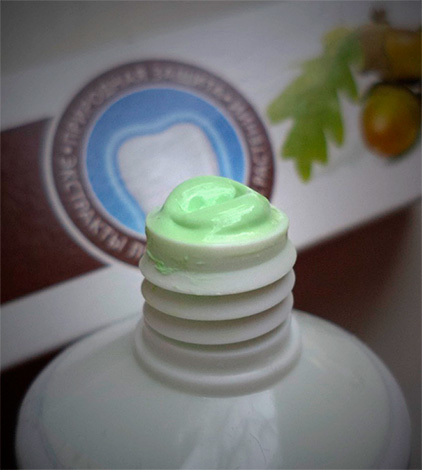
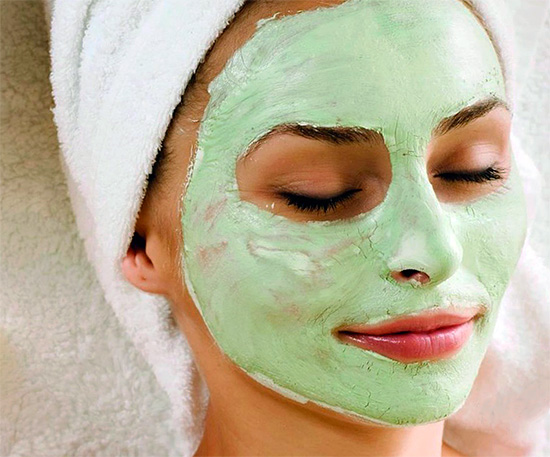
Secondly, along with pathogenic bacteria, toothpaste (for example, containing triclosan) is quite capable of destroying those microorganisms that the skin needs in order to carry out various protective and metabolic processes. This in the end can only contribute to the emergence of new skin problems.
We conclude: it is impossible to completely get rid of acne on the face with the help of toothpaste. You can only smear the inflamed points with a correctly selected paste so that the resulting inflammation passes as quickly as possible.
But about which toothpaste is better to smear acne, it is worth talking separately ...
What pastes to choose for acne?
As we already explained above, toothpaste containing antiseptic and anti-inflammatory components can help get rid of inflammation at the place of acne faster. For dental purposes, such pastes are commonly used to treat gums.
Here are some examples:
- Lacalut Activ Herbal - the chlorhexidine contained in it is a classic antiseptic whose action is complemented by the anti-inflammatory effect of components such as bisabolol, myrrh, eucalyptus, sage and chamomile.

- Forest Fort Balsam with a high concentration of medicinal herbs decoctions (oak bark, fir, chamomile, St. John's wort, celandine, etc.);

- Splat Medicinal Herbs - with extracts of sage, chamomile, sea buckthorn and hawthorn, also with geranium essential oil;

- Rox Bionics;
- Pomorin Anti Parodontosis;
And etc.
In general, the following components of toothpastes contribute to the suppression of the vital activity of pathogenic microorganisms:
- Triclosan (by the way, this is too powerful an antiseptic, so you should not brush your teeth regularly with such pastes in order to avoid oral dysbiosis);
- Chlorhexidine (the same observation applies as for triclosan);
- Bisabolol;
- Mexidol;
- Extract of oak bark, chamomile, sage;
- Hydrogen peroxide and carbamide peroxide (remember the 3% hydrogen peroxide sold in the pharmacy, which is used to disinfect wounds);
And etc.
Toothpastes containing just such components could, in certain cases, help get rid of acne.In this case, you should always remember about a possible allergic reaction to individual compounds, therefore, it is preliminary recommended to conduct such a test:
- a small amount of toothpaste is applied to the wrist;
- if after 1 hour the skin under the paste layer turns red, a burning sensation is felt, then it is obvious that it is better not to apply such toothpaste to the face, since redness at the site of the acne will only worsen;
- if there are no unpleasant sensations, and the skin on the wrist does not turn red, then the paste is suitable for an experiment to accelerate the elimination of acne, although some side effects are not excluded (for example, the appearance of local dry skin).
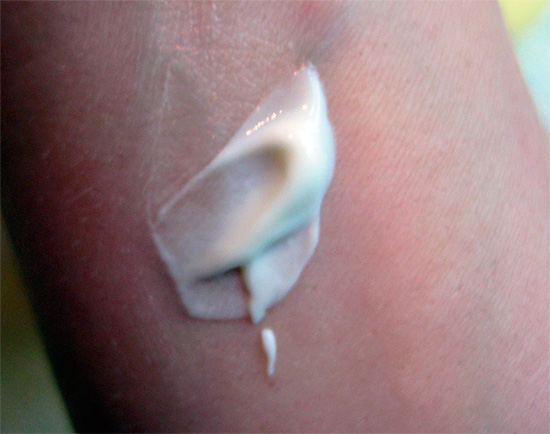
It is important to understand that special acne lotions such as Acnevert or Normaderm as a whole will more effectively cope with the tasks of removing inflammation than any toothpaste. And although none of these lotions can help get rid of acne in general, they eliminate the inflammation quite well.
Feedback
“I tried to remove acne with toothpaste last week, I decided to find out if this really works. Very dry skin, many acne just dried out and that's it. The result was clearly visible. Those pimples that I squeezed out and then spread, were almost invisible the next morning, I didn’t even have to apply a tonic. But already at lunchtime at work, spots and even a small irritated area again appeared in the same places. Smeared pasta with Aquafresh Ultimate. "
Yana, Tomsk
Traditional medicine tips for using acne paste
In accordance with the popular "recipes" of traditional medicine, toothpaste on the surface of acne is usually recommended to be applied for at least one hour. This means that it will not be enough to lubricate the sore in the toilet with it, hold it for a couple of minutes and rinse. Judging by the reviews on the Internet, many people try to keep toothpaste in the area with acne for about 2-3 hours.
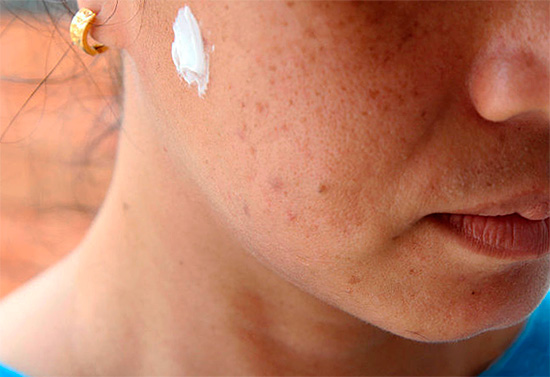
Often, the paste is applied to the skin immediately before bedtime so that it acts on the inflamed area all night. In this case, it is believed that the effect will be greater if you smear acne, from which pus has already been squeezed out.
We remind you once again that applying toothpaste to acne all night can be dangerous, because after 6-7 hours of sleep, active ingredients (for example, enzymes and peroxides) can severely damage the skin, as a result of which scars will form on it in the future.
Feedback:
“A couple of times I made myself masks with toothpaste. They say they are good for acne. But they didn’t like that the skin was very dry, in the morning the whole face seemed to be tightened. I don’t have many acne to take risks. If you just smear on each pimple, then it dries out immediately, but this is dangerous, because pus is preserved there, and then it is difficult to remove it. For this, I prefer to simply anoint the skin with alcohol lotion. ”
Tanya, Moscow
It is most safe to smear acne with toothpaste in the evening, 2-3 hours before bedtime, and wash it off just before bedtime. In this case, a thin layer of paste is applied to the skin and gently rubbed into the inflamed area.
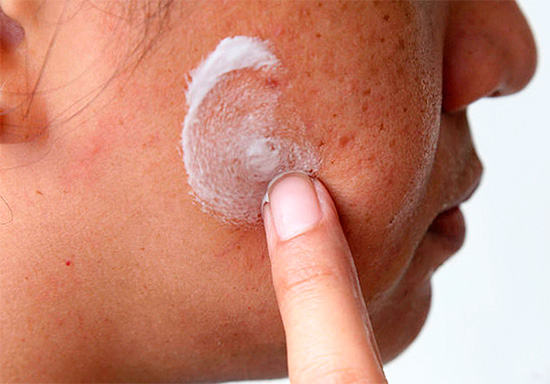
After washing off the paste, it is advisable to wipe the skin with a moisturizing lotion so that it is softened all night.
Security measures
With careful use of a properly selected toothpaste, it rarely gives any side effects on the skin (and how to choose the right one, see above). Usually it is the wrong choice and abuse in the hope of a quick and pronounced result that leads to various troubles.
To avoid them, you should:
- Keep the paste on the skin for no longer than 3-4 hours;
- To apply precisely, only on the places of extruded acne. Making masks with toothpaste is not recommended;
- At the first signs of burning, allergies or tightness of the skin, stop using the product.
It is definitely not recommended to treat acne with toothpaste for people with dry skin. In them, even the rare application of small amounts of paste to the skin causes its coarsening and the appearance of additional cracks and crusts.
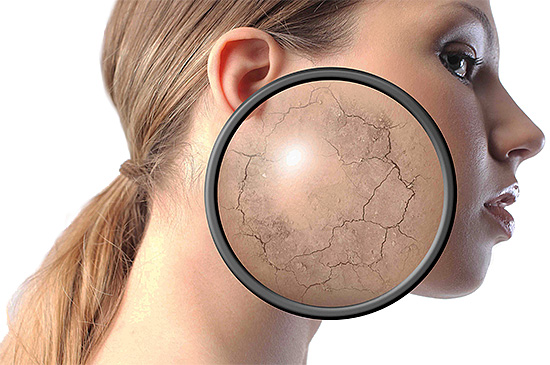
Feedback
“I did not believe in my time that they would even think of such a thing - apply toothpaste to acne! I recently visited a dentist and found out if it is true that you can get rid of acne with toothpaste. The doctor said that for the first time he hears this, and that the paste from the skin does not penetrate into the body and does not change the metabolism. That is, acne will be in any way. And if you hold it on the skin for a long time, then there may be irritation. So I would not risk using ... "
Anna, Michurinsk
In a sense, the use of acne toothpastes is another popular method of psychotherapy, which rarely gives a pronounced result, but allows a person not to sit back with folded arms, but to do something as if useful. It is useful for those who plan to get rid of acne through toothpaste to accept the fact that it is better to do it all the same with the help of special cosmetics. And toothpaste will bring much more benefit if used for its intended purpose.
Video about simple and very effective ways to get rid of acne on the skin
A few more interesting and innovative ways to use toothpaste

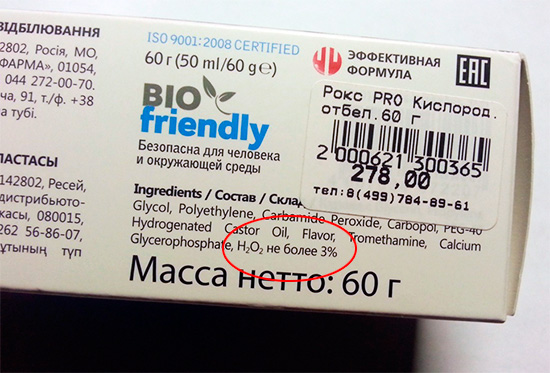
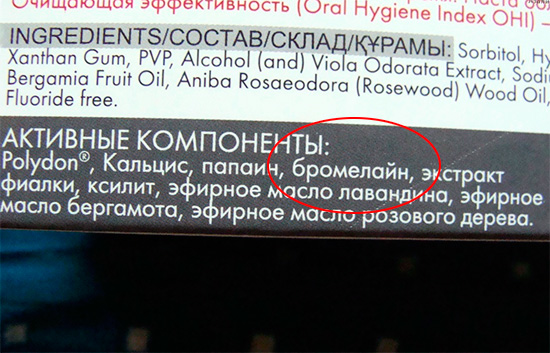
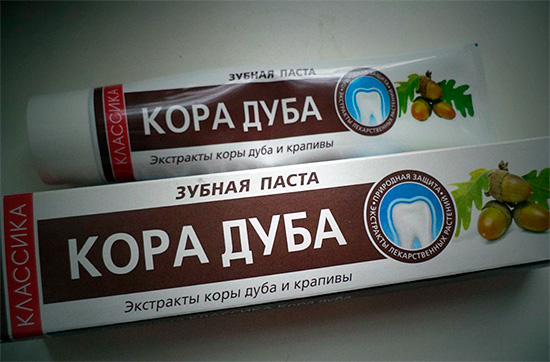
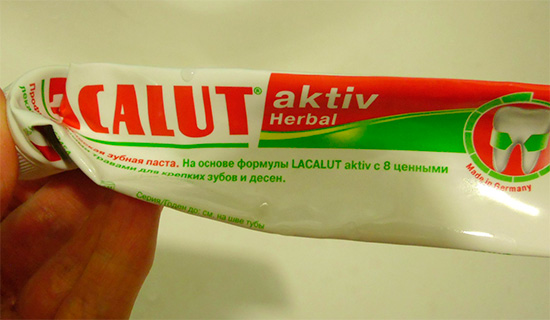
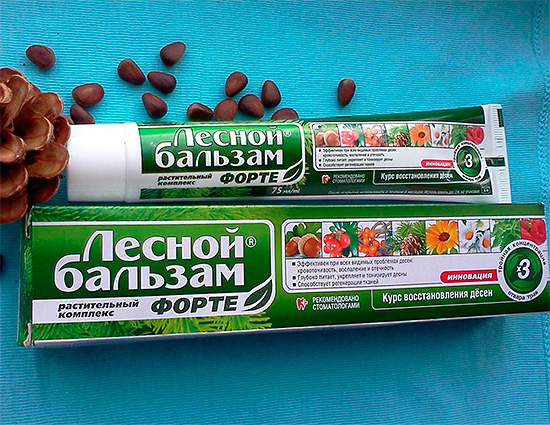
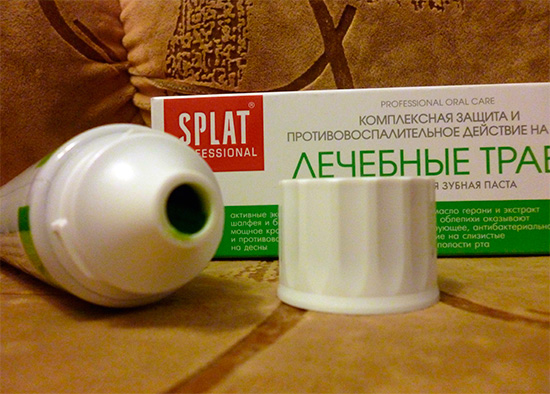
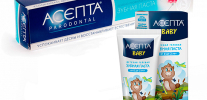
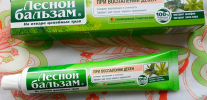
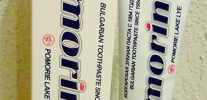
Squeeze a lemon and a cotton swab into a lemon juice. And burn pimples. Repeat 4 times a day. The next day they are no more 🙂
Zinc paste dries well, namely paste, not ointment. If applied after a metrogil, then acne generally disappears quickly. But when nothing is at hand, then toothpaste will probably come off 🙂
Toothpaste is not suitable for everyone. I tried colgate with propolis here - it only got worse, in my opinion, although I expected that propolis would somehow enhance the action. And in general, everything is individual. Many praise this zinc ointment, but I applied it to acne and did not see anything. Maybe it really needs to be applied after the metrogil, but someone uses without it, and can’t get enough of it.
Personally, I have doubts about the effectiveness of this method! Pasta can also cause allergies. I do not like such experiments.
I hear a lot about the fact that it is harmful, etc. People, and you did not think that these your special acne remedies are also harmful? Take the same solantra - I read out that she used to wash cows from parasites! And how is it more beneficial than toothpaste?
Personally, in favor of solantra, the high cost and the fact that it was sold in a pharmacy would convince me. This is the psychology. The more expensive, the better it seems, although in reality everything is far from being so ...
Yes, in my opinion it is easier to spread with zinc paste, the same thing. Or I still smear with salicylic alcohol, and when the skin starts to peel off, then with a metrogyl, it helps a lot.
Do not smear toothpaste on your face!
I smeared the paste on acne 1 time in 8-10 days. Nothing happened to the skin, left 4 times overnight. For a month, my face is generally clean ...